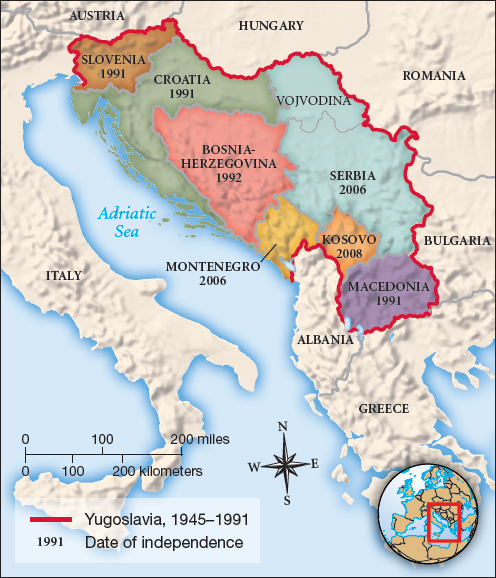Exploring American Histories: Printed Page 934
Exploring American Histories, Value Edition: Printed Page 764
Global Challenges and Economic Renewal
Clinton faced numerous foreign policy challenges during his two terms in office. As the first president elected to office in the post–Cold War era, Clinton could approach trouble spots without the rigid anti-Communist views of his predecessors. Increasingly, the problems facing the United States did not result from customary military aggression by one nation against another; rather, the greatest threats came from the implosion of national governments into factionalism and genocide, as well as the dangers posed by Islamic extremists.
At first, the Clinton administration acted cautiously. During a civil war in the African nation of Rwanda, Hutu extremists dispatched armed militias to exterminate the ethnic Tutsi population. The United States watched from the sidelines, along with most of the rest of the world. The slaughter of more than 800,000 Tutsis and moderate Hutus brought condemnation but little action other than the United Nations’ attempt to evacuate refugees from the massacre. Following this tragedy, Hollywood told the story of this genocide in the movie Hotel Rwanda (2004), which occasioned sympathy for the plight of the Rwandan victims, if not shame for the inaction of the United States.

By contrast, Clinton responded boldly to violence in the Balkans, an area considered more vital to U.S. national security than Rwanda. Along with the collapse of Eastern European regimes in 1989, Yugoslavia splintered into religious and ethnic pieces after the crumbling of the ruling Communist regime. The predominantly Roman Catholic states of Slovenia and Croatia declared their independence from the largely Russian Orthodox Serbian population in Yugoslavia. In 1992 the mainly Muslim territory of Bosnia-Herzegovina also broke away, much to the chagrin of its substantial Serbian population (Map 29.1). This unleashed a civil war between Serb and Croatian minorities and the Muslim-dominated Bosnian government. Supported by Slobodan Milošević, the leader of the neighboring province of Serbia, Bosnian Serbs wrested control of large parts of the region and slaughtered tens of thousands of Muslims through what they euphemistically called ethnic cleansing. In 1995, following three years of violence, Clinton sponsored NATO bombing raids against the Serbs and dispatched 20,000 American troops as part of a multilateral peacekeeping force. At the same time, the president brokered a peace agreement, known as the Dayton Peace Accords, among Serbia, Croatia, and Bosnia at a conference in Dayton, Ohio. In 1999 renewed conflict erupted when Milošević’s Serbian government attacked the province of Kosovo to eliminate its Albanian Muslim residents. Clinton and NATO responded by initiating air strikes against the Serbs and placing troops on the ground, actions that preserved Kosovo’s independence. (Milošević was later brought before the World Court to face trial for war crimes but died before the court reached a verdict.)
The United States faced an even graver danger from Islamic extremists intent on waging a religious struggle (jihad) of terror against their perceived enemies and establishing a transnational Muslim government, or caliphate. Former presidents Jimmy Carter in Iran and Ronald Reagan in Lebanon had experienced the wrath of radical Muslims. The United States’ close relationship with Israel placed it high on the list of terrorist targets, along with pro-American Muslim governments in Egypt, Pakistan, and Indonesia. In 1993 Islamic militants orchestrated the bombing of the World Trade Center’s underground garage, which killed six people and injured more than one thousand. Five years later, terrorists blew up American embassies in the African nations of Kenya and Tanzania, killing hundreds and injuring thousands of local workers and residents. In retaliation, Clinton ordered air strikes against terrorist bases in Sudan and Afghanistan. However, the danger persisted. In 2000 al-Qaeda terrorists blew a gaping hole in the side of the USS Cole, a U.S. destroyer anchored in Yemen, killing seventeen American sailors.
International terrorism did not lead to the undoing of President Clinton, but more mundane, sexual indiscretions nearly brought him down. Starting in 1995, Clinton had engaged in consensual sexual relations with Monica Lewinsky, a twenty-two-year-old White House intern. Clinton denied these charges under oath and before a national television audience, but when Lewinsky testified about the details of their sexual encounters, the president recanted his earlier statements that he had never had “sexual relations with that woman.” After an independent prosecutor concluded that Clinton had committed perjury and obstructed justice, the Republican-controlled House voted to impeach the president on December 19, 1998, the first time it had done so in 130 years. However, on February 12, 1999, Republicans in the Senate failed to muster the necessary two-thirds vote to convict Clinton on the impeachment charges.
Despite his impeachment, Clinton left the country in more prosperous shape than he had found it. At the height of the sex scandal in 1998, the unemployment rate fell to 4.3 percent, the lowest level since the early 1970s. The rate of home ownership reached a record-setting nearly 67 percent. As the “misery index”—a compilation of unemployment and inflation—fell, the gross domestic product grew by more than $250 billion. By 1999 the stock market’s Dow Jones average reached a historic 10,000 points, up 2,000 points from just two years before. The Clinton administration boasted that its economic policies had succeeded in canceling the Reagan-Bush budget deficit, yielding a surplus of $230 billion for the fiscal year 2000. This boom, however, did not affect everyone equally. African Americans and Latinos lagged behind whites economically. The gap between rich and poor widened, as the wealthiest 13,000 American families earned as much income as the poorest 20 million. Despite these shortcomings, most Americans seemed pleased with the economic renaissance of the Clinton years.
Review & Relate
|
How did conflicts between Democrats and Republicans affect President Clinton’s accomplishments? |
How did the end of the Cold War shape President Clinton’s foreign policies? |